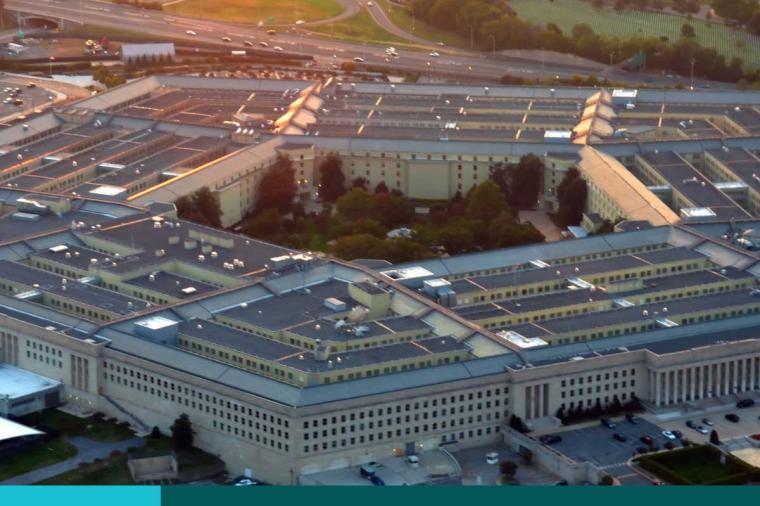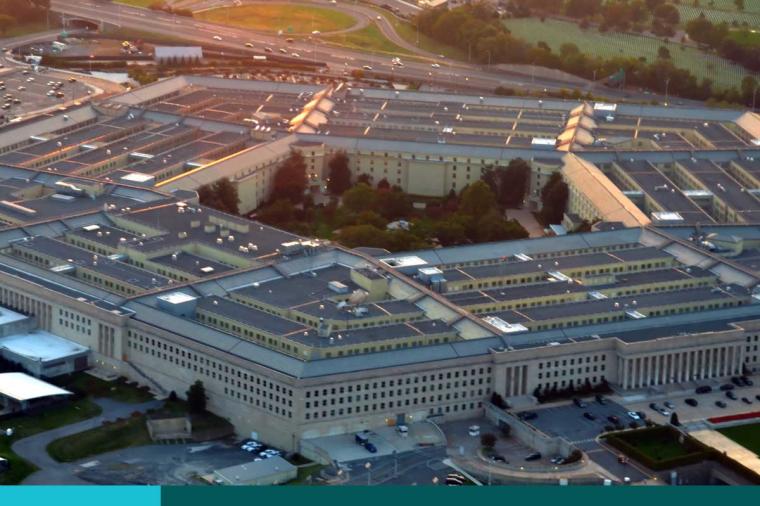Federal Government, Market Intelligence, Technology
Aging infrastructure, outdated hardware and overall modernization needs have been a mission-critical challenge for the DoD. It’s not just about IT headaches; there are real obstacles to modernization for the Department. Let’s look at what’s driving the urgency to update in multiple ways and how IT companies can position themselves to help modernize the nation’s defense backbone.
Cybersecurity, Market Intelligence, News, Technology
table, th, td {
border: 1px solid #c9edfa;
padding: 5px;
}
The National Defense Authorization Act (NDAA) is passed annually to define the Department of Defense’s priorities and guide how funds are allocated. While it doesn’t directly appropriate money, it shapes the direction of defense spending and sets the framework for future contracts. This makes it a key indicator of where IT investments and opportunities will emerge.
Market Intelligence, Technology
The Space Systems Command (SSC) Front Door is now the go-to portal for businesses looking to work with the US Space Force. As the Space Force budget is requested as high as $39 billion, including all FY26 requests and reconciliation funding, IT companies have a bigger role to play than ever.
Federal Government, Market Intelligence, Technology
The Department of Defense (DoD) Defense Innovation Unit (DIU) recently introduced the Digital OnRamp Platform, designed to connect private sector organizations with DoD opportunities. It’s scheduled for release in the fall of 2025, and leverages advanced AI and large language model (LLM) technologies to simplify and enhance the process of matching private sector capabilities with defense needs
Cybersecurity, Federal Government, Market Intelligence, Technology
The DoD is rolling out aggressive updates to its supply chain cybersecurity framework. If you sell software, services or infrastructure into the Defense Industrial Base (DIB), expect tighter requirements, faster timelines and zero tolerance for compliance gaps. These changes affect your ability to win and keep DoD contracts—especially with new programs like:
Federal Government, Infrastructure, Market Intelligence, Technology
The White House recently introduced a major change in how the federal government plans to procure goods and services in its ongoing effort to eliminate waste, fraud and abuse. In an Executive Order published on March 20, 2025, it calls for all federal procurement to consolidate under General Services Administration (GSA) management. This essentially centralizes all federal agencies’ purchasing of technology products and services to one agency.
Cybersecurity, Market Intelligence
To enhance federal cybersecurity, Rep. Nancy Mace, R-S. Carolina, introduced the Federal Contractor Cybersecurity Vulnerability Reduction Act of 2025 (H.R. 872) on January 31, 2025. A similar bill introduced the previous year stalled in the Senate. This bill aims to close a critical gap in federal cybersecurity standards by ensuring that all federal contractors implement a vulnerability disclosure policy consistent with the National Institute of Standards and Technology (NIST) guidelines. Shontel Brown, D-Ohio, cosponsors the bill.
AI, Cybersecurity, Market Intelligence
The Army is moving fast to stay ahead in the digital battlefield. To make this happen, it is driving modernization initiatives to boost operational effectiveness and strengthen national security with a comprehensive IT modernization strategy. If you're in IT sales, knowing what the Army is focusing on can help you tailor your solutions to their needs and effectively establish a trusting partnership in the long run. Let's examine the top five IT modernization initiatives that are shaping the Army's 2025 vision and see how your tech solutions can help.
Cybersecurity, IT Infrastructure, Market Intelligence
The final CMMC rule went into effect December 16, 2024.
Cybersecurity, Federal Government, Market Intelligence, Technology
The US military information network comprises over 15,000 classified and unclassified networks facilitating information exchange for service members worldwide. Known as the Department of Defense Network (DoDIN), it includes devices such as computers, mobile phones, weapons, servers, and data systems consistently serving military personnel at all levels. Data sharing across these devices has been under frequent threats of cyberattacks by adversaries and necessitates keen vigilance by the Defense Information System Agency (DISA) to manage risks and vulnerabilities.
Cybersecurity, Federal Government, Market Intelligence
Defending against cyberattacks is an ongoing battle for the Air Force, Army, and Navy, and requires strategic maneuvering and intelligent solutions. An integral part of these solutions has been the collaboration and technical support from the defense industrial base (DIB). Recently, the principal cyber advisors from each branch announced their challenges and priorities geared toward addressing cyber needs.
Cybersecurity, Federal Government, Infrastructure, Market Intelligence
Recently the Office of the Director of National Intelligence (ODNI) released a roadmap entitled Vision for the IC Information Environment to outline a vision to protect the nation from adversaries and maintain a “strategic advantage" over those intending to harm its information infrastructure. The roadmap contains recommendations from a collaboration of more than one hundred technical leaders from the intelligence community (IC).
Big Data, Market Intelligence
For the United States Navy, data has become a cornerstone of its operations, guiding the course of missions, and ensuring the safety of personnel. Every facet of maritime endeavors, from intelligence gathering, to navigation and logistics, relies on a steady stream of accurate and timely data. Harnessing and making the best use of that data, though, comes with its own challenges. These can include limited bandwidth, stringent security protocols, and the sheer volume of information generated across a host of platforms.
Federal Government, Healthcare, Market Intelligence, Technology
Modernizing the defense healthcare system has never been more front and center for Defense Health Agency (DHA), the Department of Defense's (DOD) primary arm that manages all things healthcare for military service members and their beneficiaries. With acts of war and terrorism arising from overseas and the possibility of having our troops involved in future conflicts, patient healthcare and service preparedness are top priorities for the agency. So, the DHA is looking to work across federal agencies and industry to strengthen its healthcare systems.
Big Data & Analytics, Data and Analytics, Federal Government, Geospatial, Market Intelligence
As the demand for trustworthy visual data collection and advanced technologies to support strategic decision-making continues to rise, geospatial intelligence plays a vital role in delivering essential military and environmental insights to the intelligence community. Recently at the GEOINT Conference in St. Louis, leaders from several intelligence agencies shed light on the future of geospatial intelligence (GEOINT) and its relationship with emerging technologies.
Cybersecurity, Federal Government, Market Intelligence, Technology
The Department of Navy (DON) recently held its annual WEST Conference, this year with a strong emphasis on cybersecurity. The conference brought together key decision-makers from the Navy, Marine Corps, and Coast Guard, along with experts from various industries and government officials. The discussions were broad-ranging, covering topics related to naval warfare, technology, innovation, and cybersecurity.
Federal Government, Market Intelligence, Technology
At a recent Armed Forces Communications & Electronics Association (AFCEA) DC luncheon, Defense Information Systems Agency (DISA) Director Lt. Gen. Robert J. Skinner highlighted three key priorities for the fiscal year 2023: posture, position and partnerships. These priorities reflect the agency's ongoing efforts to meet the changing threats of today and secure the future of its information systems.
Cybersecurity, Market Intelligence, Technology
“We must find fresh ways to connect forces, allies, and partners that provide an effective response to the challenge of a highly contested environment not seen in the last 20 years. Given the challenges we face today and in the future, we simply have no choice but to become more interoperable,” said General CQ Brown JR., U.S. Air Force Chief.
Market Intelligence
Interoperability for the Department of Defense (DoD) and Defense Health in particular speaks to the idea of information being more easily shared across systems. Technology vendors and channel partners who emphasize interoperability in the tools and solutions they sell to the DoD can find success anywhere in this vast department, from the warfighting side (for example, see our blog on Air Force interoperability) to the world of defense health.
Application Lifecycle, Cloud Computing, Cybersecurity, DevSecOps, Market Intelligence
"We are making progress. This really is not just about technology. This is about changing our processes changing our approach to delivering and operating technology to IT systems and our cyber mechanical warfare systems as we move forward," said Robert Vietmeyer, DoD Director for Cloud and Software Modernization.
Cloud Computing, Cybersecurity, DevSecOps, Market Intelligence
"Zero Trust is a cybersecurity strategy and framework that embeds IT security mechanisms throughout an architecture that generate metadata used to secure, manage, and monitor every device user, application, and network transaction at the perimeter and within every network enclave."
From the Department of Defense (DoD) Zero Trust Reference Architecture v1.0
Big Data & Analytics, Cybersecurity, Market Intelligence
President Joe Biden signed the National Defense Authorization Act (NDAA) for fiscal year 2022 (FY22) into law on December 27, 2021. It authorizes $770 billion in defense spending which is a 5% increase over last year. This marks 61 consecutive years that a bill received bipartisan support from congress (a display of agreement that has become increasingly rare for DC politics).





















